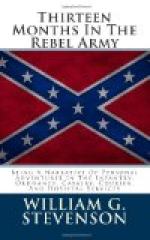of them were too drunk to pronounce the word,—but
the more sober ones prevailed, and they examined the
evidence. The hearsay amounted to nothing, and
they plied me with questions as to my views on slavery.
I answered promptly, but briefly and honestly, that
I held no views on that subject to which they should
object, and that I had never interfered with the institution
since I came among them, nor did I intend to do so.
My calmness seemed to baffle them for a moment, but
the bottle was passed, and I noticed that all reason
fled from the great majority. Words grew hot and
fierce, and eyes flashed fire, while some actually
gnashed their teeth in rage. I saw that the mob
would soon be uncontrollable unless the chairman brought
matters to an end, and suggested, that as there was
no evidence against me, they should bring the trial
to a close, when to my surprise they produced the
letter written to my father but thirty-six hours before,
as proof conclusive that I was a Northern abolitionist.
I then saw, what I have had abundant evidence of since,
that the United States mail was subject to the inspection
of Vigilance Committees in the South at their pleasure.
The ruffianism of these scoundrels did not allow them
even to apologize for their crime. The only phrase
in the letter objected to was the unfortunate but
truthful one, “This is a hard place.”
I never felt its force as at that instant. It
served as a catch-word for more abuse. “Yes,
we’ll make it a hard place for you before you
get out of it, you infernal spy,” &c. The
chairman argued rather feebly as I thought—but
he understood his audience better than I did—that
the letter was free from any proof against me, that
I was an innocent-looking youth and had behaved myself
correctly, that I evidently did not know much about
their peculiar institution, and he thought I had no
designs against it. They then went into a private
consultation, while I kept my place upon the counter,
though gradually moving back to the further edge of
it. I saw the crisis was at hand, for smothered
but angry argument was going on in knots of men all
over the room; my life was suspended upon a breath,
and I was utterly powerless to change the decision,
whatever it might be; but I must say that my nerves
were steady and my hand untrembling,—the
unwonted calmness of one who knew that death was inevitable
if they should decide in the affirmative on the charge,
and who was determined to defend himself to the last,
as I well knew any death, they could there
inflict, was better than to fall into their hands to
be tormented by their hellish hate.




